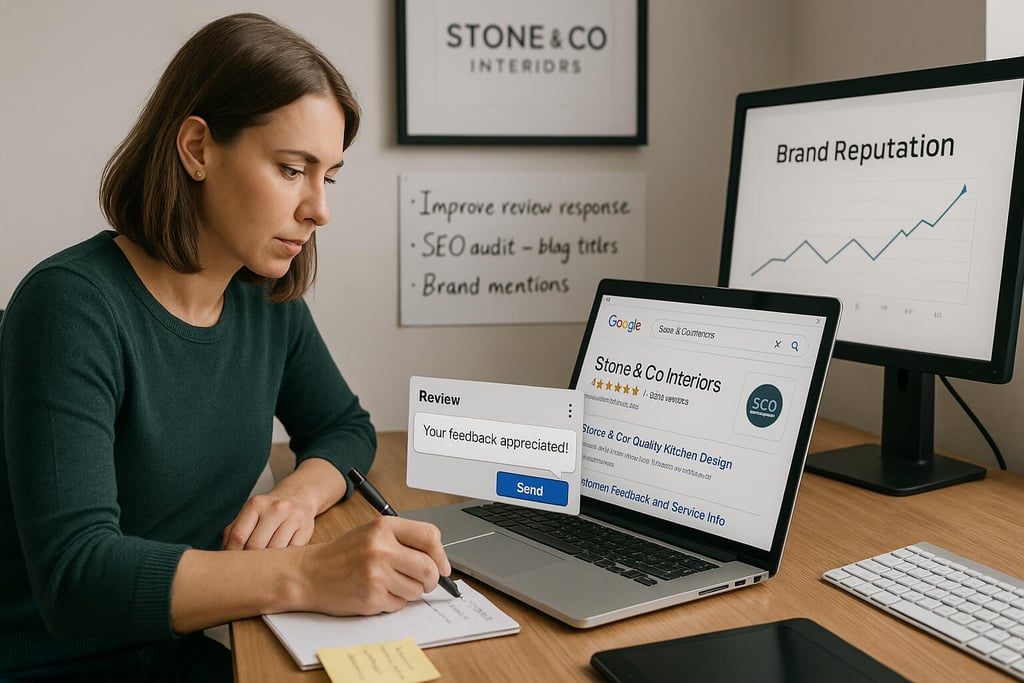SEOJet Flight Blog
SEO Reputation Management: Boost Your Online Visibility
SEO Reputation Management: Boost Your Online Presence. Discover how SEO strategies manage your online reputation. Improve your online presence with online reputation management.
SEO FOR LOCAL COMPANIES
Ardene Stoneman
4/15/20256 min read


SEO and Online Reputation Management: How SEO Shapes Your Brand’s Perception
Online reputation management and SEO are no longer separate fields. The way your business appears in search results directly affects how people perceive your brand.
If a customer searches your name and sees negative reviews, irrelevant content, or outdated listings, that reputation damage can cost you sales.
SEO reputation management is about shaping your brand’s online presence to protect and improve how it looks to customers, journalists, investors, and potential partners.
This article explains how SEO ties into online reputation management, what techniques work, and why it matters at a local level.
If your business depends on visibility and trust, especially in local search results, this is a topic you can’t afford to ignore.
Outline
What Is SEO Reputation Management?
Why Does Online Reputation Management Matter for SEO?
What Is the Connection Between SEO and Reputation?
How Can Search Engine Optimisation Improve Reputation?
Why Do Google Reviews and Online Review Sites Affect SEO?
What Are the Best Reputation Management Strategies for SEO?
How Can Local SEO Protect Your Business's Reputation?
What Is Search Engine Reputation Management?
What Should You Do About a Negative Review?
Can Positive Content Really Help with SEO Reputation Management?
How Do You Monitor Your Online Presence Effectively?
When Should You Hire a Reputation Management Company?
What Does SEO for Online Reputation Management Actually Involve?
How Can You Maintain a Positive Online Reputation Over Time?
Summary and Key Reminders
1. What Is SEO Reputation Management?
SEO reputation management means using search engine optimisation to control what shows up when someone searches for your brand.
The goal is to push positive online content higher in the search engine results and reduce the visibility of negative reviews or outdated information.
This approach isn’t just for large corporations. Local businesses, startups, and ecommerce shops all benefit from managing their online presence through SEO.
2. Why Does Online Reputation Management Matter for SEO?
Search engines decide what to show based on many factors - keywords, content quality, relevance, and engagement signals. If your brand is tied to negative reviews or poor online reputation signals, it can impact how you rank for even unrelated search terms.
A bad online reputation doesn’t just harm customer trust - it can actively drag down your SEO performance too.
And the link goes both ways: strong SEO can help correct potential reputation issues before they grow.
3. What Is the Connection Between SEO and Reputation?
SEO and reputation are intertwined. When people Google your brand, they judge you based on the first page of results.
That includes your homepage, your social profiles, customer reviews, and any news coverage. If negative content ranks high, your brand suffers - even if your products or services are solid.
Reputation management in SEO is about influencing the content and links that appear at the top of the search engine results page.
That involves technical SEO, content creation, and digital PR - all working together to shape your online presence.
4. How Can Search Engine Optimisation Improve Reputation?
Good SEO involves more than keywords. It’s about relevance, recency, and authority. Here are a few ways SEO plays a role in reputation:
Publishing positive content that ranks
Earning links from trusted sites
Optimising pages for branded keywords
Creating FAQs and answers to common criticisms
Structuring your site to make the right pages visible
With effective SEO strategies, you’re not just driving traffic. You’re helping manage your reputation online by shaping how people view your business.
5. Why Do Google Reviews and Online Review Sites Affect SEO?
Google reviews are indexed directly in local search results. They appear in your Google Business Profile and affect your visibility in maps and the local pack.
A string of negative reviews can hurt your local search rankings.
On the other hand, encouraging customers to leave positive reviews helps both your reputation and your SEO.
Review management means responding to feedback, asking for new customer reviews, and dealing with negative ones in a way that shows accountability.
Search engines factor in review volume, recency, and overall rating.
6. What Are the Best Reputation Management Strategies for SEO?
There’s no one-size-fits-all solution, but here are proven reputation management strategies that align well with SEO:
Build a content hub to rank for branded terms
Use press releases to push positive news
Create a response plan for bad press or complaints
Use schema markup to show trust indicators like ratings
Optimise for long-tail variations of your brand name
These help you maintain a positive online presence across various online platforms while reinforcing your SEO efforts.
7. How Can Local SEO Protect Your Business's Reputation?
Local SEO is especially important for managing your business’s reputation at a community level.
People searching for services in your area will see your business’s Google Business Profile, customer reviews, and related content.
Key tactics to focus on:
Keep local listings consistent
Encourage reviews on Google and other sites
Respond publicly to negative feedback
Create local content around events, services, or offers
What matters at a local level often shows up first in search, making local SEO a key part of your reputation management toolkit.
8. What Is Search Engine Reputation Management?
Search engine reputation management is about pushing down unwanted results and promoting helpful or neutral content.
It’s often used after a reputation crisis - such as a viral complaint or article - but it’s just as useful as a preventative tactic.
This means creating more indexed pages around your brand, optimising social profiles, and promoting positive content that’s likely to appear at the top of the search result.
The more visibility you control, the less room there is for negative content to dominate.
9. What Should You Do About a Negative Review?
Not every negative review needs removing. In fact, most can be used to show your professionalism.
Steps to handle it:
Respond calmly and helpfully
Offer to resolve the issue privately
Ask satisfied customers to leave more reviews to outweigh the negative one
Monitor patterns to spot any fake or unfair content
Negative reviews only become reputation issues if they dominate the search result or go unanswered. Review management is a continuous process.
10. Can Positive Content Really Help with SEO Reputation Management?
Yes. Publishing well-optimised positive content helps you take up space in the search engine results page. That might include:
Case studies
Testimonials
Articles about community involvement
Product guides or Q&A content
Company updates
If you want to appear at the top for branded keywords, filling the space with trusted and positive online content is the most direct route.
11. How Do You Monitor Your Online Presence Effectively?
Reputation management means keeping track of your brand online. This can be done with:
Google Alerts for your brand name
Manual searches across Google, Bing, and DuckDuckGo
Tools like SEMrush or Ahrefs for keyword and brand monitoring
Review platforms that notify you of new reviews
Managing your online presence is about visibility, but also response time. The faster you spot issues, the faster you can address them.
12. When Should You Hire a Reputation Management Company?
If your brand’s reputation is being seriously affected by negative content, legal issues, or viral criticism, it may be time to bring in professionals.
A good online reputation management company will:
Audit your current presence
Develop ORM strategies
Launch positive content campaigns
Work with SEO professionals to improve your rankings
But it’s also important to vet any company carefully. Avoid those who offer black-hat tactics or promise quick removals that can backfire.
13. What Does SEO for Online Reputation Management Actually Involve?
SEO for online reputation management includes several overlapping tasks:
Technical SEO to ensure your site is crawlable
On-page optimisation for branded keywords
Backlink building to improve authority
Online content creation that ranks for your brand name
Local SEO work including Google Business Profile optimisation
Structured data and schema implementation
Responding to reviews and user-generated content
It’s not a campaign you do once - it’s part of ongoing SEO efforts. A strong brand online is one that doesn’t wait for problems to appear.
14. How Can You Maintain a Positive Online Reputation Over Time?
To maintain a good reputation online, you need consistency and awareness.
Ongoing habits include:
Publishing fresh content regularly
Updating and monitoring your Google Business Profile
Asking customers to leave positive reviews
Keeping social media active and moderated
Auditing your brand's online mentions every quarter
It’s also worth revisiting your SEO techniques. As algorithms shift, so do the opportunities to protect and improve your online reputation.
15. Summary and Key Reminders
SEO and online reputation management work together to protect and shape how your brand appears in search results.
Review management, especially Google reviews, affects your visibility in local SEO.
Positive content creation is one of the strongest tools for reputation management SEO.
Negative reviews must be responded to - don’t leave them unchallenged.
Local businesses should focus on local SEO to manage their reputation in nearby search results.
Search engine optimisation is an active part of maintaining a positive online reputation, not a passive one.
If you're serious about managing your online presence, improving your rankings, and avoiding a negative reputation, talk to SEOJet. We'll help shape your brand online with effective SEO strategies that support long-term trust and visibility.
Services
Contact Us
Newsletter Signup
sales@seojet.co.uk
01934 289 404
© 2025. All rights reserved.


Locations
Weston-super-Mare
Somerset
Bristol
9am - 6pm, Monday to Friday
Suite 2, Unit 7, 12 Beaufigter Rd, Weston-super-Mare, BS24 8EE
